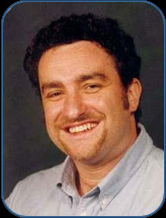Dr. Gianmarco Radice
The article Paint could alter asteroids course said
“Researchers from Glasgow University are looking into the possibility of spraying lumps of rock and ice with paint to knock them off course.Dr Gianmarco Radice, who is leading the research, told the Daily Record newspaper: ‘With an asteroid you are faced with the danger posed by one piece of rock.
‘Blow it to pieces and you could be faced with the even bigger problem of many more smaller pieces of rock hurtling towards the earth.
‘Ours would be an unmanned mission. There would be no need for Bruce Willis.’”
Dr. Gianmarco Radice is Senior Lecturer at the Department of Aerospace Engineering at the University of Glasgow and course director for the MSc in Space Mission Analysis and Design degree programme. He is helping organize the upcoming 2007 Planetary Defense conference to be held in Washington DC in March. The objective of this conference is to develop a white paper that assesses the current state of our ability to discover and track near earth objects (NEOs — objects that could possibly impact Earth) and our ability to successfully deflect a threatening object should one be detected.
Gianmarco authored Development of an autonomous spacecraft for planetary exploration, and coauthored On the Solution of Interplanetary Trajectory Design Problems by Global Optimization Methods, Autonomous action selection for micro-satellite constellations, Line-of-sight guidance for descent to a minor solar system body, Cost function analysis for autonomous clustered micro-spacecraft, Optimal Results For Autonomous Attitude Control Using The Potential Function Method, Time-Varying Potential Function Control For Constrained Attitude Tracking, and Autonomous Slew Manoeuvring And Attitude Control Using The Potential Function Method.
He earned his M.Eng in Aerospace Engineering from Politecnico di Milano in 1996 and his PhD in Space Systems Engineering from the University of Glasgow in 2000. He has also worked on Phase II of the Improved Mission Autonomy and Robustness study led by the British National Space Centre.
His research interests range from spacecraft attitude control, to formation flying, from trajectory design to autonomous systems, from concurrent engineering to space tethers.
